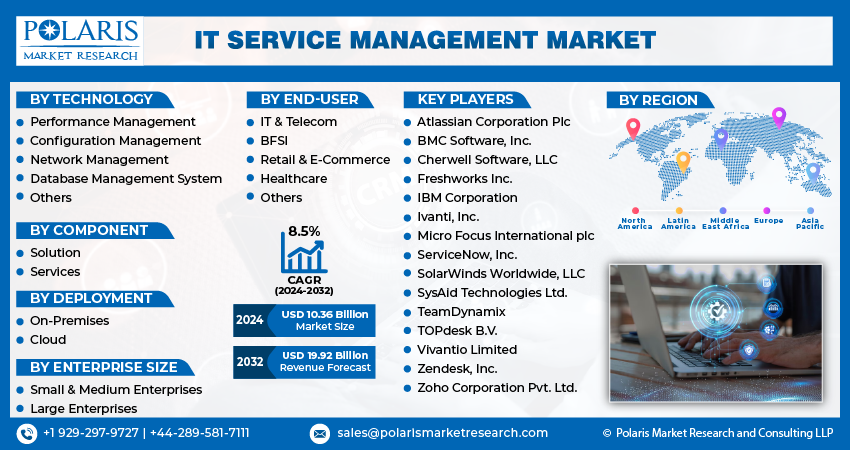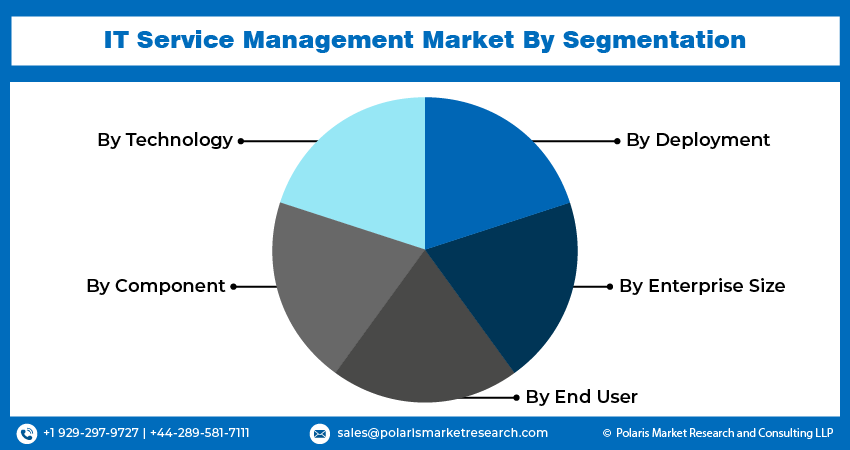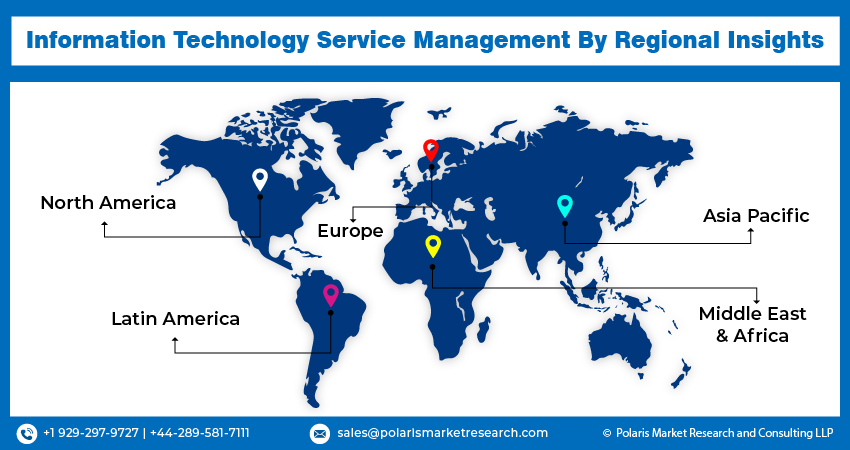
Information Technology Service Management Market Share, Size, Trends, Industry Analysis Report, By Technology; By Component (Solution, Services); By Deployment; By Enterprise Size; By End-User; By Region; Segment Forecast, 2024 - 2032
- Published Date:Jan-2024
- Pages: 115
- Format: PDF
- Report ID: PM4127
- Base Year: 2023
- Historical Data: 2019-2022
Report Outlook
The global information technology service management market was valued at USD 9.57 billion in 2023 and is expected to grow at a CAGR of 8.5% during the forecast period.
Information Technology Service Management (ITSM) holds a central position in the contemporary business environment, facilitating the effective administration of IT assets, the provision of high-quality services, and the alignment of IT operations with corporate goals. The ITSM landscape is in a state of constant evolution, molded by the synergy of diverse elements, such as technological progress, shifting business requirements, and the ever-changing demands of customers.

To Understand More About this Research: Request a Free Sample Report
The digital transformation wave has made ITSM indispensable. Organizations are digitizing their operations, necessitating robust ITSM frameworks to manage complex, integrated technology ecosystems effectively. End-users and customers expect seamless, always-on IT services. ITSM is crucial for delivering exceptional customer experiences and maintaining a competitive edge. ITSM contributes to cost savings by optimizing IT resource utilization, reducing downtime, and minimizing operational inefficiencies.
Moreover, many industries must comply with stringent data security and privacy regulations. ITSM solutions help ensure that IT operations align with these regulatory requirements. ITSM fosters innovation by enabling rapid deployment of new services and technologies, enhancing business agility.
- For instance, in October 2023, Sentar Inc. secured the Information Technology Service Management (ITSM) Support contract for the National Cyber Range Complex (NCRC) Event Planning, Operations, and Support (EPOS).

However, employees and organizations may resist changing established IT processes, hindering the implementation of new ITSM solutions. Deploying ITSM solutions can be complex and time-consuming, leading to delays and unexpected costs. Integrating ITSM with legacy systems and diverse technologies can be challenging, especially for organizations with heterogeneous IT environments. Also, the initial investment in ITSM solutions can deter smaller organizations and those with limited budgets.
Growth Drivers
- Growing IT Complexity is projected to spur the product demand.
As businesses become more complex, IT service management (ITSM) solutions are becoming increasingly necessary to maintain control and ensure smooth operations. With the rise of remote work and the need for remote IT support, companies are investing in ITSM solutions that can cater to a dispersed workforce.
Enhanced service quality and operational efficiency are crucial drivers. ITSM enables organizations to deliver services reliably and streamline internal processes. Additionally, businesses recognize the value of adopting best practices for IT service management, as outlined in ITIL (Information Technology Infrastructure Library) and other industry standards. The need to protect sensitive data and comply with data privacy regulations demands robust ITSM solutions to maintain data integrity and ensure compliance.
Report Segmentation
The market is primarily segmented based on technology, component, deployment, enterprise size, end-user, and region.
|
By Technology |
By Component |
By Deployment |
By Enterprise Size |
By End-User |
By Region |
|
|
|
|
|
|
To Understand the Scope of this Report: Speak to Analyst
By Technology Analysis
- Database Management System segment is expected to witness highest growth during forecast period
The database management system segment is projected to grow at a CAGR during the projected period. Database management systems play a pivotal role in ITSM by facilitating the efficient storage, retrieval, and management of critical data and information. As organizations increasingly rely on data-driven decision-making, the demand for sophisticated DBMS solutions has surged. The growing adoption of cloud-based ITSM platforms and the integration of AI and automation are further propelling this segment. DBMS vendors are offering scalable, high-performance solutions, ensuring data integrity and accessibility. This growth underscores the indispensable role DBMS plays in supporting the broader ITSM market's effectiveness and efficiency.
By Component Analysis
- Solution segment accounted for the largest market share in 2022
The solution segment accounted for the largest market share in 2022 and is likely to retain its market position throughout the forecast period. ITSM solutions encompass software and tools designed to streamline IT service delivery, enhance operational efficiency, and improve customer support. The ever-evolving technology landscape, the need for remote support, and the integration of AI and automation are driving demand. Vendors are offering customizable, cloud-based ITSM solutions, making them accessible to organizations of all sizes. Furthermore, the growing importance of data security, compliance, and IT service quality is compelling businesses to invest in comprehensive ITSM solutions, underlining the continued expansion of this information technology service management market segment.
By Deployment Analysis
- Cloud segment held the significant market revenue share in 2022
The cloud segment held a significant market share in revenue share in 2022. The Cloud segment is experiencing substantial growth. The migration to cloud-based ITSM solutions offers scalability, flexibility, and cost-efficiency, driving adoption across industries. Cloud ITSM provides organizations with the ability to remotely manage services, access data, and streamline operations, a particularly crucial feature in the context of remote work environments. The integration of cloud technologies with ITSM tools also supports data security, compliance, and disaster recovery, making it an attractive proposition. This growth underscores the pivotal role of cloud solutions in reshaping and enhancing ITSM practices in the digital age.
By Enterprise Size Analysis
- Small & Medium Enterprise segment is expected to witness highest growth during forecast period
The Small and Medium Enterprise (SME) segment is witnessing significant growth within the Information Technology Service Management (ITSM) market. SMEs are recognizing the importance of efficient IT service management to remain competitive and responsive to evolving customer demands. They are increasingly adopting ITSM solutions that are tailored to their specific needs and budgets.
The rising complexity of IT environments, even within smaller organizations. Cloud-based ITSM solutions offer cost-effective, scalable, and flexible options for SMEs, enabling them to manage IT services more effectively. Moreover, the growing trend of remote work and the need for efficient remote IT support have made ITSM solutions more critical than ever for SMEs. They enable SMEs to maintain service quality and business continuity while supporting a dispersed workforce.
Additionally, the integration of AI and automation in ITSM solutions is making them more accessible and user-friendly for SMEs, streamlining operations and enhancing service quality. The growth of the SME segment underscores the increasing importance of ITSM in helping smaller enterprises stay competitive and resilient in an evolving business landscape. It also highlights the opportunity for ITSM providers to cater to this expanding market.
By End-User Analysis
- IT & telecom segment accounted for the largest market share in 2022
The IT & telecom segment accounted for the largest market share in 2022 and is likely to retain its market position throughout the forecast period. The increasing complexity of IT and telecom infrastructure necessitates effective ITSM solutions. With the relentless expansion of data networks, cloud services, and communication technologies, the demand for ITSM is higher than ever. IT and telecom companies are turning to ITSM solutions to optimize service delivery, manage resources efficiently, and ensure data security. The integration of AI and automation in ITSM further streamline operations and supports faster issue resolution. This growth emphasizes the pivotal role that ITSM plays in ensuring service quality, reliability, and performance in the ever-evolving IT and telecom sector.

Regional Insights
- North America region dominated the global market in 2022
The North America region dominated the global market with the largest market share in 2022 and is expected to maintain its dominance over the anticipated period. The growth of the segment market is largely attributed to the region's businesses and organizations increasingly recognizing the essential role of ITSM in managing complex IT environments, optimizing service delivery, and ensuring data security. With the rapid digital transformation across various industries, the demand for ITSM solutions continues to rise. The integration of AI and automation further enhances ITSM capabilities, facilitating quicker issue resolution and resource management.
Additionally, the shift to remote work arrangements has underscored the importance of effective IT support and service delivery, driving further adoption of ITSM solutions. These factors, combined with the stringent focus on data privacy and compliance, highlight North America's position as a major growth hub for the information technology service management market.

Key Market Players & Competitive Insights
The information technology service management market is fragmented and is anticipated to witness competition due to the presence of several players. Major service providers in the market are constantly upgrading their technologies to stay ahead of the competition and to ensure efficiency, integrity, and safety. These players focus on partnership, product upgrades, and collaboration to gain a competitive edge over their peers and capture a significant market share.
Some of the major players operating in the global market include:
- Atlassian Corporation Plc
- BMC Software, Inc.
- Cherwell Software, LLC
- Freshworks Inc.
- IBM Corporation
- Ivanti, Inc.
- Micro Focus International plc
- ServiceNow, Inc.
- SolarWinds Worldwide, LLC
- SysAid Technologies Ltd.
- TeamDynamix
- TOPdesk B.V.
- Vivantio Limited
- Zendesk, Inc.
- Zoho Corporation Pvt. Ltd.
Recent Developments
- In August 2023, Spark introduced ServiceFlex, an innovative and adaptable service management solution that harnesses intelligent technology, automation, and artificial intelligence to assist corporate entities, large enterprises, and government organizations in reaching their strategic business objectives.
Information Technology Service Management Market Report Scope
|
Report Attributes |
Details |
|
Market size value in 2024 |
USD 10.36 billion |
|
Revenue forecast in 2032 |
USD 19.92 billion |
|
CAGR |
8.5% from 2024 – 2032 |
|
Base year |
2024 |
|
Historical data |
2019 – 2022 |
|
Forecast period |
2024 – 2032 |
|
Quantitative units |
Revenue in USD billion and CAGR from 2024 to 2032 |
|
Segments covered |
By Technology, By Component, By Deployment, By Enterprise Size, By End-User, By Region |
|
Regional scope |
North America, Europe, Asia Pacific, Latin America; Middle East & Africa |
|
Customization |
Report customization as per your requirements with respect to countries, region and segmentation. |
FAQ's
key companies in information technology service management market are BMC Software, Inc., Cherwell Software, LLC, Freshworks Inc., IBM Corporation
The global information technology service management market is expected to grow at a CAGR of 8.5% during the forecast period.
The information technology service management market report covering key segments are technology, component, deployment, enterprise size, end-user, and region.
key driving factors in industrial information technology service management market are Growing it complexity is projected to spur the product demand
The global information technology service management market size is expected to reach USD 19.92 billion by 2032
